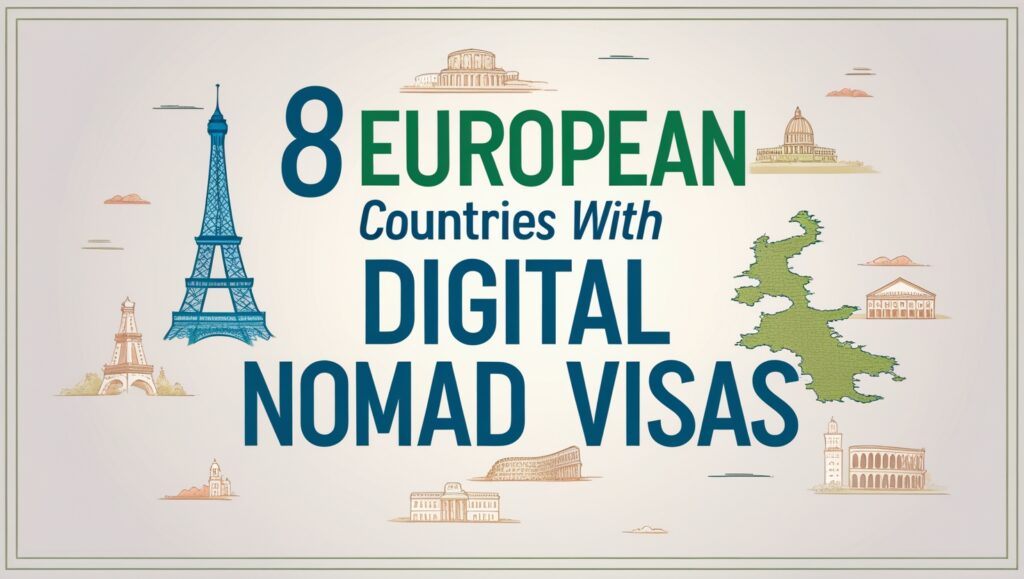No products in the cart.
Uncategorized
8 European Countries With Digital Nomad Visas
Europe is a digital nomad’s dream. It has it all: Incredible cities, rich history, and spectacular scenery. It’s no wonder more and more digital nomads are looking to Europe as their next place to live and work remotely. And many European countries now have digital nomad visas, making it easier than ever to explore all the EU has to offer.
You’ll learn:
- What is a digital nomad visa?
- What to look for in a digital nomad visa
- 8 European countries with digital nomad visas
- eSIMs for digital nomads
What Is a Digital Nomad Visa?
Digital nomad visas fill the gap between short-term tourist visas and long-term work permits. In Europe, they allow digital nomads to live and work in an EU country beyond the typical 90-day limit (usually for up to one year). Nearly all digital nomad visas require that the holder is self-employed or employed by a foreign company, can work remotely, and can provide proof of a minimum income level.
What To Look For in a Digital Nomad Visa
Here’s what to keep in mind when deciding on a digital nomad visa to apply for:
- How long do I want to stay in the country?
- Do I meet the minimum income requirements?
- Do I have family members that will be joining me?
- Will I be able to afford the cost of living?
- How fast is the internet? What about mobile networks?
- Are there co-working spaces? Are public spaces remote work-friendly?
- Will I need health insurance?
- How will I handle my taxes? Will I be considered a tax resident?
- What is the climate like?
- How will I get around? Is it easy to travel to and from my destination?
8 European Countries With Digital Nomad Visas
Europe has several countries with digital nomad visas. Here are eight to consider.

Unsplash
Cyprus For Digital Nomads
This island nation in the Mediterranean serves up the perfect mix of sun, sand, and ancient history. If you’re looking for ancient archeological sites, stunning landscapes, and beautiful beaches, Cyprus is your digital nomad destination.
The Digital Nomad Visa
The Cyprus digital nomad visa was launched in 2021. It allows digital nomads to stay and work remotely for one year and can be extended by another 24 months. Visa holders can bring their families, but family members can only work in Cyprus with their own permits.
Eligibility Requirements
- Non-EU/EEA/Swiss citizen
- Minimum income requirement: €3,500/month
- Must be employed by a foreign company
- Minimum €30K health insurance coverage
How To Apply
You can apply for a Cyprus digital nomad visa at the Civil Registry and Migration within three months of arrival.
Best Cities For Digital Nomads
The top cities for digital nomads to live and work in Cyprus are Nicosia, Larnaca, Limassol, and Paphos. These cities are safe and enjoy temperate weather year-round. They also have reliable internet connections and plenty of cafes and co-working spaces for remote workers.

Unsplash
Estonia For Digital Nomads
Dubbed the “Silicon Valley of Europe,” Estonia is the ideal place for digital nomads who work in tech. The country has five times more startups per capita than any other European country. And it has plenty of opportunities to explore the great outdoors away from your laptop.
The Digital Nomad Visa
Estonia was also the first country in Europe to have a digital nomad visa, which it launched in June 2020. Visa holders can stay in Estonia for one year with the possibility to extend it by six months. They can bring their spouse and children/dependents along with them.
Eligibility Requirements
- Non-EU/EEA/Swiss citizen
- Minimum income requirement: €3,500/month
- Must be employed by a foreign company
How To Apply
You can apply for the Estonia digital nomad visa at an Estonian consulate or embassy. Once your application is approved, you can enter Estonia and apply for an E-residence card at the Estonian Policy and Border Guard Board.
Best Cities For Digital Nomads
The top city for digital nomads in Estonia is the capital, Tallinn. It has a growing digital nomad community with lots of meetups and events. It also has fast internet speeds (103.48 Mbps), many cafes and co-working spaces, and affordable accommodation.

Unsplash
Greece For Digital Nomads
Sunny Greece is another European country with a digital nomad visa. It’s a fantastic place for digital nomads to work and play. Greece has it all — ancient ruins, whitewashed villages, and 227 islands to explore.
The Digital Nomad Visa
Greece’s digital nomad visa was launched in October 2021. It’s valid for one year, then can be extended twice. After 183 days, the visa holder will be considered a tax resident, but only half of their monthly income will be taxed for a period of seven years.
Eligibility Requirements
- Non-EU/EEA/Swiss citizen
- Minimum income requirement: €3,500/month for the main applicant, plus 20% for a spouse/cohabitant, and 15% for each child.
- Must be employed by a foreign company
- Proof of a residential address in Greece
How To Apply
Digital nomads can apply for this visa at a Greek consulate or embassy.
Best Cities For Digital Nomads
Athens, Thessaloniki, and Patras are the best cities for digital nomads to live and work in Greece. Internet speeds and amenities vary depending on where you stay (e.g., Athens vs. a small island). If you’re hoping for an island stay, opt for Crete, which remains lively outside peak tourism season and has a growing digital nomad community.

Unsplash
Hungary For Digital Nomads
Hungary has incredible architecture, a vibrant café culture, world-famous thermal spas, and stunning landscapes to explore. It serves up the perfect mix of work and relaxation for digital nomads.
The Digital Nomad Visa
Hungary’s digital nomad visa, the “White Card,” was launched in 2021. It specifically targets single nomads under forty and allows them to stay and work in the country for one year with the possibility of extension.
Eligibility Requirements
- Non-EU/EEA/Swiss citizen
- Minimum income requirement: €2,000/month
- Must be employed by a foreign company
- No family or dependents
How To Apply
Digital nomads can apply at a Hungarian consulate or embassy. If successful, they will receive an entry visa. They’ll have 30 days to enter Hungary and can apply for a White Card upon arrival.
Best Cities For Digital Nomads
Budapest is the best city for digital nomads in Hungary. It’s safe, has modern infrastructure and facilities, and fast internet and high-speed public Wi-Fi. It’s remote work-friendly with plenty of co-working spaces and cafés. And it has a relatively low cost of living compared to other European cities.

Unsplash
Malta For Digital Nomads
Malta is another European country with a digital nomad visa. It has an inviting Mediterranean climate, beautiful beaches, and rich history. Digital nomads can spend their days working in Valletta and get outdoors to hike, cycle, and climb during their downtime.
The Digital Nomad Visa
Malta’s digital nomad visa allows holders to stay and work for one year. They can renew it twice for a three-year stay.
Eligibility Requirements
- Non-EU/EEA/Swiss citizen
- Minimum income requirement: €2,700/month
- Must be employed by a foreign company
- Proof of health insurance and temporary accommodation
How To Apply
Digital nomads can apply at a Malta consulate or embassy.
Best Cities For Digital Nomads
Valetta and Sliema are the best cities for digital nomads to stay in Malta. Both are safe and have large digital nomad communities. Malta has reliable internet and 400+ public Wi-Fi spots, making it easy to work from anywhere. With affordable flights to mainland Europe, Valletta, in particular, is an excellent base for European travel.

Unsplash
Portugal For Digital Nomads
Portugal’s laidback vibes, stunning scenery, and 300 days of sunshine yearly have made it a digital nomad hotspot. There’s plenty to see and do, from coastal cities like Porto and Lisbon to beach towns in the Algarve and breathtaking islands like the Azores and Madeira.
The Digital Nomad Visa
Portugal’s D8 visa has two streams for digital nomads:
- The Digital Nomad Temporary Stay visa allows the holder to stay and work in Portugal for one year with the option to renew it for an additional six months. With this visa, they maintain tax residency in their home country.
- The Digital Nomad Residence Visa allows holders to stay and work in Portugal for two years. They can then apply for a residency permit to stay an additional three years. And after five years, they can apply for permanent residency. After 183 days in the country, they are considered a tax resident of Portugal.
Eligibility Requirements
- Non-EU/EEA/Swiss citizen
- Minimum income requirement: €2,800/month
- Must be employed by a foreign company
How To Apply
Digital Nomad Temporary Stay Visa applicants can apply at a Portuguese consulate or embassy. Digital nomads looking for a residence visa can apply similarly and receive a double-entry visa if successful. They must enter Portugal within four months and register as a resident at SEF (Serviço de Estrangeiros e Fronteiras).
Best Cities For Digital Nomads
The best cities in Portugal for digital nomads are Porto, Lisbon, Lagos, and Portimão. Porto and Lagos are more cosmopolitan, while Lagos and Portimão have more of a resort-style beach vibe. All have large digital nomad and expat communities, fast internet speeds, and plenty of co-working spaces.

Unsplash
Romania For Digital Nomads
Romania has a growing digital nomad community due to its large IT sector and reputation for having the fastest internet connection in the region. It’s also a haven for outdoor enthusiasts, with the Black Sea, Carpathian Mountains, and Danube Delta all within reach.
The Digital Nomad Visa
Romania launched its digital nomad visa in 2021. It allows digital nomads to live and work in Romania for one year, with the opportunity to extend it for another. Digital nomads won’t be charged income tax, assuming their home country is taxing them.
Eligibility Requirements
- Non-EU/EEA/Swiss citizen
- Minimum income requirement: €3,950/month
- Must be employed by a foreign company
How To Apply
Digital nomads can apply on the Romanian eVisa platform. Most applications are processed within 10-14 days.
Best Cities For Digital Nomads
The best cities in Romania for digital nomads are the capital, Bucharest, and Timisoara. Both offer fast internet, plenty of co-working spaces, and an affordable cost of living.

Unsplash
Spain For Digital Nomads
Spain is another European country with a digital nomad visa. With its Mediterranean beaches, UNESCO-listed cities, and incredible food, it’s no wonder it tops many digital nomads’ lists. Plus, Spain has some of the fastest internet speeds in Europe.
The Digital Nomad Visa
Spain launched its digital nomad visa in early 2023. It allows digital nomads to live and work in Spain for one year, with the possibility to renew it for up to five years. Close relatives can join if they provide proof of sufficient funds. And remote workers earning less than €600K/year are subject to a reduced tax rate of 15% for their first four years in the country.
Eligibility Requirements
- Non-EU/EEA/Swiss citizen
- Minimum income requirement: €2,334/month
- Must be employed by a foreign company. If self-employed, can receive a maximum of 20% income from Spanish firms.
- Proof of qualifications/experience (three years’ work experience or a university degree/professional certificate)
How To Apply
Digital nomads can apply at a Spanish consulate or embassy.
Best Cities For Digital Nomads
The best cities for digital nomads in Spain are Barcelona, Madrid, Valencia, Alicante, Malaga, and Sevilla (to name a few). There are plenty of co-working spaces and remote-work-friendly establishments in these cities, and many have vibrant digital nomad communities.

eSIMs for Digital Nomads
One of the perks of being a digital nomad in Europe is the ease of travel between countries. Most digital nomad visas allow you to travel freely within the Schengen zone, giving you access to 27 EU countries to explore.
So, how do you stay connected when you’re always on the move? Easy: Use an eSIM!
What Is an eSIM?
An eSIM is an embedded SIM — a reprogrammable chip built into your device during manufacturing. Like a physical SIM card, it identifies you as a mobile subscriber and connects you to a carrier’s network. But it does it all digitally.
You can purchase an eSIM package, install it on your device, and instantly connect to a mobile network when you arrive at your destination. There’s no need to swap out your physical SIM, manage multiple SIM cards, or seek a local SIM vendor. You can do everything right from your smartphone.
Benefits of eSIMs for Digital Nomads
An eSIM allows you to stay connected wherever you travel. Here are a few ways using an eSIM can benefit you as a digital nomad:
- No roaming fees. Most eSIM plans are prepaid, so you don’t need to worry about accidental roaming charges while you travel.
- Tether your eSIM data. No Wi-Fi connection? No problem. You can tether your eSIM data to another device, like a tablet or laptop.
- 100% digital. There’s no need to keep track of a physical SIM card for every destination — you can save up to eight digital eSIM profiles on most smartphones.
- Top up your data. Many Airalo eSIM packages have a top-up function, which allows you to top up your data, calls, or messages on the go.
- Share your adventures. Use your eSIM data to send emails, connect with your loved ones, and post on social media in real-time.
- Stay connected. You don’t need to rely on a Wi-Fi connection to get online — instead, you can use an eSIM to access data wherever you travel.
Where To Get an eSIM
Airalo is an eSIM marketplace that gives you access to affordable eSIMs for 200+ countries and regions worldwide. If you’re traveling Europe, you can even select a regional package to stay connected across multiple countries with a single eSIM.
Here’s how to get started:
- Visit airaloesim.com
- Choose an eSIM plan for your destination.
- Install the eSIM on your device.
- Turn on your eSIM line when you arrive and instantly connect to a mobile network.
Are you embarking on a digital nomad adventure? Visit the Airalo store to find an eSIM for your destination.

